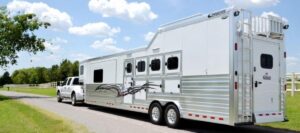It has been my professional observation that the general population lacks familiarity with the “rules of law” that govern our lives, the repercussions for violations, and the process involved between discovery of a violation and the imposition of punishment. I’m not just talking about criminal laws or traffic laws. In the world of equestrian competition in the United States, while USEF imposes the “rule of law,” few USEF members have any useful understanding of how the process works when a violation is alleged.
The rules most encountered by the USEF membership are those involving Drugs & Medications (“D&M”). Competitors are well familiar with the concept of the random drug testing that goes on at recognized competitions, and the shame of having one’s name be printed at the back of Equestrian magazine. But what about the in-between? What if you are actually selected for testing at a show? What then?
“Your horse has been selected for testing.”
Tip #1 – Stick to the tester like glue.
When the tester walks up to you as you exit the ring and tells you that you have been selected for testing, this is the start of the process. Your reaction to this news will probably depend on whether you have been tested so many times that yet another test feels like a hassle, or whether you have never been tested and are suddenly paralyzed with anxiety. But here is what should happen next:
- Note what time it was when you were notified that you were selected. This information gets put on the sample card and it is very relevant (as I will explain later).
- The tester should stay with your horse from the moment of selection until all samples have been collected, sealed, and witness cards signed.
- You, or a competent, English speaking adult acting on your behalf, should stay with the horse and the tester, as well. DO NOT send your horse and the tester back to the stabling area with a non-English speaking groom.
- Watch the samples being taken from your horse. Watch the vet draw the blood and watch the urine going into the cup. Note the time each sample was obtained.
- Watch the samples being sealed. You must insist on watching the vet seal the blood sample (i.e. tape it shut with the numbered tab from the sample collection card) and the urine sample.
- You will be asked to sign the sample collection card indicating that you witnessed the sample collection and the sealing of the sample. DO NOT SIGN THE CARD UNTIL AFTER THESE THINGS HAVE OCCURRED.
- There is a place on the card (that you are being asked to sign) that indicates the time your horse was selected for testing and the time each sample was collected. Make sure these times are accurate.
- If there is any kind of discrepancy or irregularity that you cannot work out with the testing vet, then get the show steward involved. DO NOT LET ANYTHING SLIDE.
Perfection is an unrealistic goal. The testing vet and their techs are only human and they DO make mistakes and on occasion they simply cut corners and bend the rules. The biggest reason why you cannot take a relaxed approach to your horse’s selection for testing is: You may be asked to witness the collection and sealing of a sample before it has been collected. Of course, this is not supposed to happen, but it does. My clients report that it has happened to them, and it has happened to me (personally). And if you have entrusted your non-English speaking groom to witness the collection and sealing, I can almost guarantee that the groom is not going to challenge the testing vet when being asked to sign on the dotted line.
You get a letter from USEF that says: “The sample taken from your horse tested positive for the drug(s)…. You may submit a letter of explanation.”
Tip #2 – Responding to the Notice of Charge
If the sample taken from your horse tests positive, you will get a “friendly” letter from USEF advising you of your violation of the Rules and inviting you to submit a “letter of explanation.” I have always felt that this initial communication from the USEF Regulation Department is deceptive in its friendliness. Members receiving this letter are inclined to believe that if they send in an explanation of how the positive test might have occurred that the charge will be dismissed and they can go on their merry way. DON’T KID, YOURSELF!
To be fair, what this letter should say is: “Your horse tested positive and you are going down. Anything you say can and will be held against you. We know exactly what you gave your horse and when, so don’t bother lying to us because then we won’t just think you are a cheat, we will know it for sure.”
Most people don’t realize that once the lab has tested the sample, USEF knows what was given to the horse and when. But USEF doesn’t share this information with you. Rather, it invites you to “submit an explanation.” USEF DOESN’T NEED YOUR EXPLANATION – it is just giving you the opportunity to dig yourself in deeper. Oh, I can hear you now – “But what if I am telling the truth? Doesn’t it help to be completely truthful?” Here’s the problem: You can try to be 100% truthful, but you cannot be sure what USEF has convinced itself is the truth. And it really doesn’t matter if you give USEF the explanation it was looking for because if there was a violation of the Rules, you are just admitting your guilt and are still going to get punished in some way.
Frankly, it is this part of the process that I feel is fundamentally unfair to USEF Members. USEF should not withhold its lab file from charged members at this stage of the process because there is really NO WAY anyone can reasonably be expected to provide an explanation for a situation the details of which have not been fully disclosed to them. It’s like a not-funny game of Pictionary where the charged Member struggles to come up with an answer but will lose no matter what.
The Offer of Administrative Penalty – Wait for it.
Whether you provide an “explanation” to the violation or not, the next correspondence you will receive from USEF will be either an Offer of Administrative Penalty or an invitation to have your case heard before the Hearing Committee. Like with a traffic ticket, this is the “admit guilt and send in your fine” option. You can accept the offer, or reject the offer and try to plead your case before the Hearing Committee.
The process of offering an administrative penalty is one the USEF instituted a number of years ago, and I believe it to be a good option in most cases. In any case, it is a nice way for USEF to streamline the process. In the “old days” all cases went before the Hearing Committee , which made the process quite drawn out and expensive for everyone involved.
However, at this point, most Members are shocked that they are actually facing some kind of penalty. Let’s remember, folks, the “trainer” is “strictly liable” for any violation of the D&M Rules. In other words, if there is a violation, the “trainer” is on the hook. Period. End of story. The definition of “strictly liable” is essentially “there is no defense.” However, there are a (very) few viable defenses that will result in a D&M Rule violation case being dismissed. Please note that I said “defenses,” as opposed to “excuses.” An “excuse” is not a “defense.”
Now, if you think you have a “defense,” then you have to present it to the Hearing Committee. This is basically a trial and the D&M Committee has a lawyer who acts like a prosecutor to present the case against you to the Hearing Committee. The D&M lawyer has prosecuted many medications cases and is exponentially better prepared to win his case than you are prepared to win (or lose) yours. I don’t understand why anyone thinks they can go into that hearing room unrepresented. In fact, at one time I suggested to USEF that if it was going to pay one lawyer to represent D&M, and a second set of lawyers to represent the Hearing Committee, that it should pay a lawyer to represent Members appearing before the Hearing Committee. After all, at the point you are in front of the Hearing Committee, you are facing suspension – and that is the horse-show equivalent of real world “jail” in terms of loss of rights and privileges and the ability to pursue your profession. But I guess I’m just a little hung up on the whole concept of “due process.” Sue me.
I will briefly summarize:
- Don’t take drug testing lightly. Make the testers follow their own rules.
- If you get a notice of violation, USEF already has all the facts it needs to make a case against you. Anything you say can and will be held against you.
- You have the right to consult an attorney. An attorney can advise you whether you have any defense worth pursuing, or whether you only have a lame excuse.
- Do not take your lame excuse to the Hearing Committee and expect to get a better result than the Administrative Penalty that was offered you.








